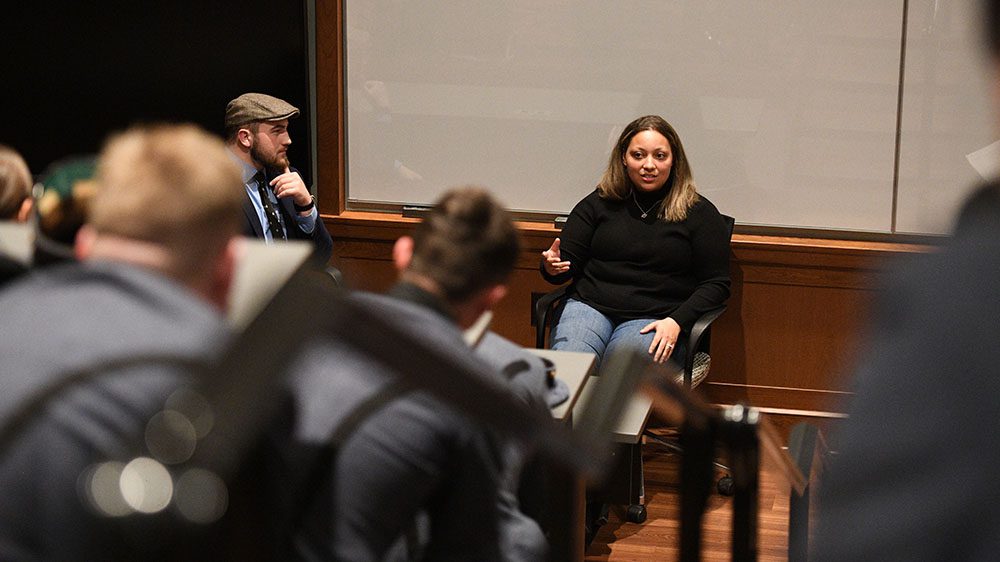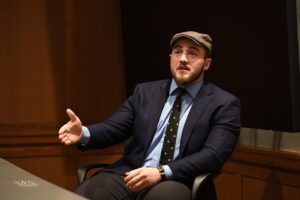Life after VMI: Alums Discuss Finding a Calling

U.S. Army 1st Lt. Annika Tice ’19 speaks during the Life After VMI: Finding a Calling forum held Feb. 20, 2023.—VMI Photo by H. Lockwood McLaughlin.

U.S. Army 1st Lt. Annika Tice ’19 speaks during the Life After VMI: Finding a Calling forum held Feb. 20, 2023.—VMI Photo by H. Lockwood McLaughlin.
“You are being prepared in a fantastic way to be morally formed, intellectually formed, to perform at a high level in any discipline, wherever you go.” That’s what Joseph “Joe” Murray ’21 told a group of approximately 50 cadets who gathered in Scott Shipp Hall Monday, Feb. 20, 2023, to hear from him and U.S. Army 1st Lt. Annika Tice ’19 about the challenges, changes, and joys found in their career paths after VMI.
The event, titled Life After VMI: Finding a Calling, was sponsored by the Department of English, Rhetoric, and Humanistic Studies and moderated by Maj. Stephanie Hodde, Ph.D., assistant professor in the department.
During their cadetships, both Murray and Tice were fully immersed in the opportunities VMI had to offer. Tice, a native of Pittsylvania County in rural Southside Virginia, was the first female cadet to serve on the VMI Honor Court and the first female cadet to earn a prestigious Fulbright teaching fellowship from the U.S. Department of State.
She double majored in English and modern languages and cultures (French), participated in the Institute Honors program, organized a leadership camp for middle school girls, and commissioned into the U.S. Army, although she’d entered VMI unsure about commissioning.
At graduation, Tice was granted a deferral from active duty to teach English to school children in the Ivory Coast through the Fulbright program. Since then, she’s completed a master’s degree in curriculum and instruction through the University of Virginia’s Curry School of Education and done additional graduate work in legal studies through Regent University.
This summer, Tice will begin a teaching residency position with the Alder Graduate School of Education, which will earn her another master’s degree, this one with a certification to teach grades kindergarten through sixth.
Unlike Tice, Murray began his cadetship sure of his desire to serve in the military. He was planning to commission into the U.S. Marine Corps, but a broken foot during his 2nd Class year prevented him from attending Officer Candidate School. That alone didn’t deter Murray, though, and in preparation for a military career, he held rank in the Corps of Cadets, serving as a master sergeant his 2nd Class year and regimental executive officer his 1st Class year.
On the academic side of cadet life, Murray participated in the Institute Honors program. He wrote his honors thesis on Aristotelian and Thomistic philosophy, and he is currently applying to doctoral programs in philosophy for the upcoming academic year.
After graduating with a Bachelor of Arts degree in English and concentrations in philosophy, literary studies, and rhetoric and writing, Murray found himself facing a crossroads. “After graduation, I was kind of looking around, and I got out of the bubble on post,” he stated. “And I realized that there’s an enormous amount of possibilities in the world for VMI graduates. … I found my calling by stumbling into it. I intended to go into the Marine Corps and ended up teaching high school English.”

Joe Murray ’21 discusses his experiences teaching high school English during a forum held Feb. 20.—VMI Photo by H. Lockwood McLaughlin.
He’s now teaching at Riverside Preparatory Academy, an all-male boarding school in Georgia. Not surprisingly, Murray found the leadership skills he’d learned as a cadet translated well to the classroom, especially with high schoolers only a few years younger than himself, although he had to adapt his approach to reach them well.
“When you’re teaching 16, 17, 18-year-olds, they look at me, ‘Oh, my brother is older than you, why are you teaching me?’” he explained. “You have to be able to relate in the way you learned at VMI,” he continued. “Leadership at VMI applies to a lot of places, and it applies to teaching very well.”
Riverside is a military academy, and many of the students there come in with negative perceptions of school and teachers. At first, Murray took the same approach to his students that he would have taken to rats at VMI, but that was an epic failure. “I was a strict disciplinarian, and I was going to have things my way every single time,” he commented. “My entire first semester was brutal for me and my students because of that. Learning how to adapt your leadership through humility is something that applies very much in teaching.”
“I had to adjust from the VMI style of leadership, but it’s still there,” he stated. “And you have to love the subject. If you don’t love it, don’t teach it. … Loving the subject and being able to express it to someone else is a unique opportunity and a blessing. It’s really fantastic.”
Tice, meanwhile, found her path by following her heart. A self-described “lifelong learner,” Tice pushed herself very hard academically at VMI, sometimes carrying as many as 21 credits a semester. “If it was challenging, I had to have my foot in it at least,” she stated.
Overseas—and away from VMI, where she acknowledged she’d felt very safe and protected—Tice faced some obstacles she hadn’t expected, such as being assigned to teach hundreds of children each day, all of whom spoke a dialect of French she wasn’t familiar with, and feeling disconnected from peers who had attended schools very different from VMI.
The COVID-19 pandemic cut Tice’s Fulbright experience short, and when she came home, it was time to begin her military service. She’s stationed at Fort Jackson, South Carolina, where she serves as an adjutant general officer. Soon, she will conclude her military career in preparation for a return to school. “I’m taking a pay cut, but I’m doing what I love,” she commented. All along, Tice noted, she’d known education was her true calling. “I’m back where I’m supposed to be.”
Responding to cadet questions at the end of their presentations, Murray stressed that the skills English majors, and VMI graduates in particular, bring to the work world are not only needed but in high demand. “Very few people are going to have the skills that you [cadets] have with speaking to superiors, with speaking to subordinates and understanding the difference there and also the difference in how to speak to peers,” Murray noted.
Other VMI-honed skills Murray mentioned were time management, writing a professional email, and voicing one’s opinions in a respectful manner in a meeting.
In her answers to questions, Tice focused on finding opportunities and following through on them, even if she didn’t meet all of the qualifications on paper. “Being comfortable was never who I was, really,” she said. “Sometimes you need to jump, and you need to take those risks. … There are definitely a lot of things that I was not fully qualified for that I have done.”

The development writer plays a key role in producing advancement communications. This role imagines, creates, and produces a variety of written communication to inspire donors to make gifts benefiting VMI. Utilizing journalistic features and storytelling, the development writer will produce content for areas such as Annual Giving, stewardship, and gift planning.